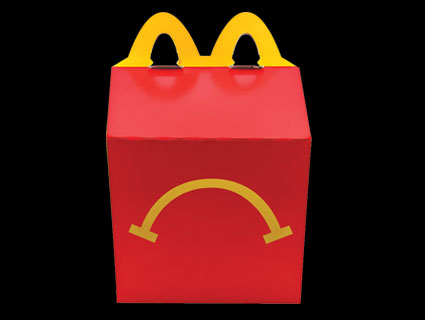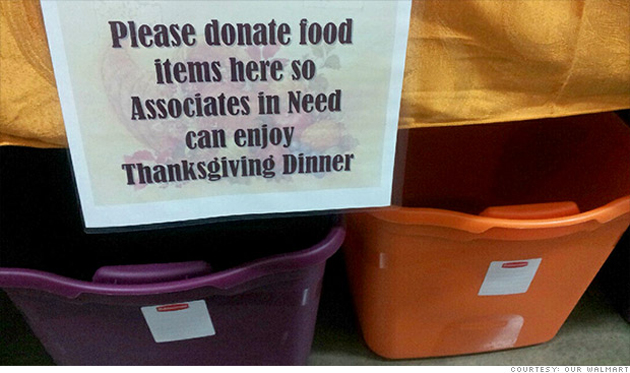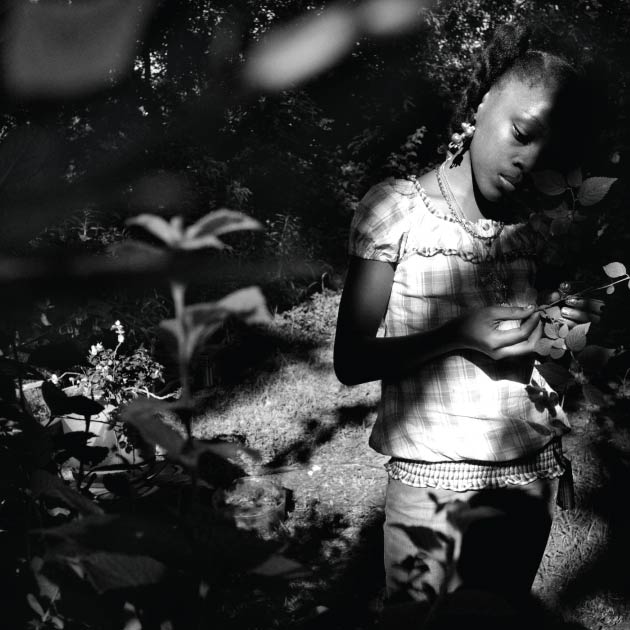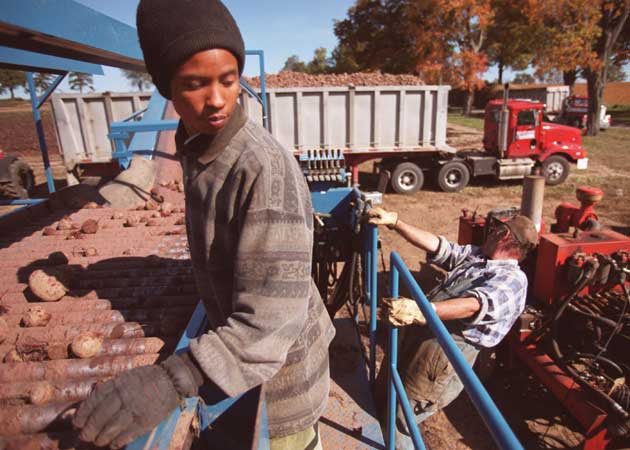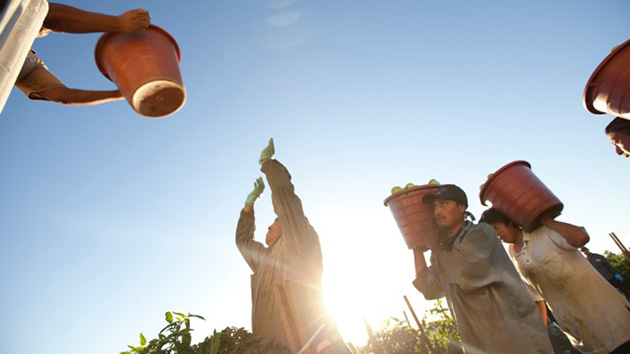
Courtesy Food Chains
Food Chains opens at the break of dawn, as tomato pickers in Immokalee, Florida, hustle onto buses and out to the fields where they spend long hours trying to pick enough fruit to survive. Late in the evening they return to cramped trailers, with barely enough wages to purchase groceries for a family meal. Though Florida’s rich soil generates hundreds of millions of dollars worth of tomatoes, those harvesting them make around $12,000 a year. And the worst part, as tomato picker Gerardo Reyes Chavez points out, at the end of the day there’s only the realization of “how little you mean to the people you are working for.”
“We’re not poor in this country—we’re screwed,” remarks farm advocate Lucas Benitez in Food Chains, an illuminating documentary about ag workers that hits theaters today. Directed by Sanjay Rawal (Ocean Monk), the film sheds light on how our produce depends on the labor of workers who are paid by the piece and are twice as likely to live beneath the poverty line as salaried employees.
Food Chains – Trailer from Screen Media Films on Vimeo.
But Food Chains isn’t just a typical tale of helpless peons getting swallowed by an oppressive system. The film, produced by Eric Schlosser (Fast Food Nation) and Eva Langoria and narrated by Forest Whitaker, highlights the progress that’s been achieved. Much of the movie traces the arduous and ultimately triumphant push by Florida’s Coalition of Immokalee Workers. After years of organizing, the CIW convinced consumers and companies to pay a “penny-per-pound” premium to tomato pickers and established a code of conduct that bans on-the-job harassment and unpaid labor.
Since 2011, national brands like Burger King and Subway have signed on to the CIW’s Fair Food Program. In January, Walmart joined. And last month, a “Fair Food” label debuted on tomatoes in Whole Foods. Ninety percent of tomato pickers in Florida now benefit from the program. In a state once deemed “ground zero for modern-day slavery,” the CIW reports finding no incidents of forced labor since the program’s inception. So far, buyers have funneled $15 million into the Fair Food Program through the premium, which shows up as a bonus on each worker’s paycheck. “The fact that the CIW was able to create this program in the most hostile environment for farm workers in the US shows me that it’s a model,” says Rawal. “If it works in Florida, it can work anywhere else.”
Food Chains‘ underlying message is that foodie-ism must encompass more than just a concern for how dinner looks and tastes. People always ask, “Where was the pig raised? What food did it eat?” says Rawal. It’s time to start asking: “What were the conditions of the workers who slaughtered that pig?”
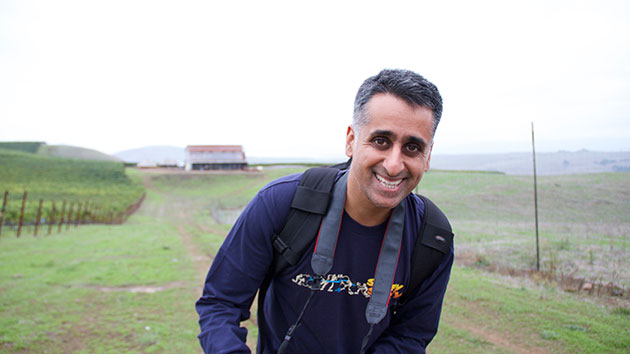
I caught up with Rawal to discuss the social cost of cheap food and his own connection to where our food comes from.
Mother Jones: Your dad has a career as a tomato geneticist. Did you guys grow tomatoes?
Sanjay Rawal: My dad worked for Del Monte and then for Monsanto as one of the chief scientists on the Calgene Flavr Savr Tomato. But it was a huge disaster because the tomato didn’t taste good. And then my dad started his own genetics company and I began doing that with him. He and I ran a genetics company for 10 years. And so I sold seeds to Florida.
MJ: The tomato your dad worked on was all about taste, right?
SR: Yeah. The Flavr Savr wasn’t about taste at all; that was just the name. It was about the shape and the shipability of it. My dad’s company was all about flavor. His tomatoes are some of the best selling at Trader Joe’s and Whole Foods. Other people grow them and sell them. My dad was a breeder. Most of his work happened in little test plots and didn’t require much labor. He tried growing them for a while, and realized that farming is hard. It’s just brutally hard. We didn’t have the interest or fortitude to farm.
MJ: Why do you think you started to pay attention to workers’ issues when you did?
SR: I worked on human rights projects in Haiti, Cameroon, and East Asia, and the bigger ones tended to do with agriculture. My role was to make sure that there was equity that remained at the base of those projects, with the workers. I had a couple of different lives. I had the human rights life, and I had the family business life. I remember being at this tomato seed conference in Fort Meyers, Florida. This was like three months after Barry [Estabrook’s] book came out. So I’m reading Tomatoland, and I’m literally 30 minutes away from Immokalee, Florida. It all hit home.
In Florida, then, and for farm workers for the most part in the US, there’s a real sense of economic segregation. In the South, the structures of economic segregation still existed. Now those people are no longer African-American; for the most part, they’re Latino. In California, it’s different. We saw people sleeping in homeless encampments in Napa Valley and Sonoma. Horrific ones in Watsonville. It’s different because you’re looking at homelessness and the lack of housing, less than something that’s institutionalized.
MJ: The Immokalee workers are central to the film and their story is so rich. Why did you feel the need to also include voices from all over the country, especially California, for this film?
SR: Farm work is a very difficult job, no matter what state you’re in. California is an important state in the history of farm work because it was the only one that let unions flourish. California is the largest agricultural state in the country, in terms of fresh produce. You can’t make a movie about farm labor without including California.
At the same time, what’s happening in Florida is revolutionary. César Chavez and Dolores Huerta spent 20 years building the United Farm Workers. A lot of the progress they achieved has been rolled back slowly. Florida was deemed by one prosecutor from the Department of Justice as “ground zero for modern-day slavery in the United States.” Horrific. And this is seven or eight years ago. But the Coalition, with a couple of farmers, and now a lot of farmers, started the Fair Food Program. They’ve gone from ground-zero for slavery to no slavery. There hasn’t been a case of slavery in the last four years since the Fair Food Program’s been in action.
Now, four years into it, they’ve got data, which showed initially a huge spike in sexual harassment complaints. That meant that, for the first time, people felt like they could complain. And now they’re showing a pretty steep decline [in complaints] because the perpetuators of those abuses are now not in the system anymore. The fact that the CIW was able to create this program in the most hostile environment for farm workers in the US shows me that it’s a model. If it works in Florida, it can work anywhere else. It’s a beautiful thing.
MJ: How is this Fair Food Program different from past efforts to reform agricultural labor standards?
SR: California state law is better than any other state law, but no one will say that the enforcement of labor laws in California is up to par with the law itself. There’s the California Transparency in Supply Chains Act, but that’s a code of conduct developed by politicians. In Florida, the code of conduct was written by the farm workers. In Florida, when you harvest tomatoes, you put them in a bucket. And that bucket holds 32 pounds with a flat top. But in the old days they made you “cup” [overfill] the bucket. So you were getting paid for 32 pounds, but you were putting in 35 pounds. And if you didn’t cup it, they would throw it back at you. So one of the first things the farm workers said was, ‘We don’t need to have a single tomato above the rim of the bucket.’ There’s no way anyone in Tallahassee or Sacramento would have been able to figure that out. But it’s critical for the workers.
MJ: Why do you think the largest grocery store retailers have been slower than fast-food chains and food-service providers to adopt the Fair Food Program?
SR: Walmart’s been the only big one that’s signed on and that doesn’t even represent a quarter of the whole market. The grocery store business is different. They have a control over the supply chain that no other business is allowed to have legally. It’s the concept of “monopsony.” There are clear laws to indict a company for monopolistic practices. But a monopsony means you control the supply chain. You control the terms under which you do business. A farm is not a direct employee of, let’s say, Kroger. And Kroger might only buy a quarter of that farm’s cucumbers. But if that farm wants to have any hope of selling to Kroger, they’ve got to make sure that every single cucumber meets Kroger’s terms. So that means Kroger effectively sets the terms for every single farm that wants to sell to it. That’s why when you go to any single store, all the cucumbers look the same. All the tomatoes look the same. This uniformity is key.
There is a law against monopsonies. And according to one economist in our movie, Shane Hamilton, it’s the most confusing law in the entire US. No one can even understand it, much less enforce it.
MJ: The film focuses on the Publix grocery store chain in Florida, which still hasn’t signed on to the Fair Food Program. You mentioned that Publix has never even agreed to speak to the CIW. You have to wonder about the psychology behind refusing to talk to a group of people who have been protesting so long.
SR: Publix is a private company. It’s still owned by the Jenkins family that lives in Central Florida. Corporate cultures are slow to change. In my opinion, one of the hardest things for Walmart to do in joining the Fair Food program was pay the extra penny. It’s not because the people that ran the program on the side of Walmart didn’t know that it was the right thing to do. But Walmart’s philosophy is shave pennies off of everything. Everyone’s measured by shaving pennies. You’re not taught to add pennies to anything.
MJ: You navigate some pretty depressing territory in this film. What were some of the moments of light during the shooting process?
SR: We really struggled with including immigration as a reality on the ground, and not just as a political reality. We were at a camp of workers in Watsonville, and this one guy started talking to us and he spoke really good English. He said, “My wife and I have a chicken farm. You should come see it.” He told me about his border crossing—super depressing—but he was like, “My wife is American.” I’m thinking, “Yeah, she’s Mexican-American.” We go to his house, and she’s blonde-haired and blue-eyed. It’s not your usual story. It wasn’t like she had some sympathy towards a certain class of immigrants; it was just love. Their first date, he didn’t speak English. If degrees weren’t an issue, he could have a very high-level job like doctor or lawyer. He’s pouring his energy into organic chicken farming. Hopefully people will go like, “Yeah, he should have a future in this country.” His wife said it: “We should feel gratitude towards the people who bring us our food. It’s hard work.”
MJ: Why were Napa’s vineyard workers a group you wanted to include?
SR: If we pick on any issue in the film it’s inequality. The progressive liberals in Napa just happen to be extremely rich. Their attitudes towards farm workers are more a function of class rather than party. You see multi-million dollar homes ringed by vineyards with people who can’t make a living wage and who live far away. There are Mexican farm workers everywhere, Latinos in every restaurant in Napa Valley, but they aren’t part of the narrative. It’s as if the narrative of Napa Valley wine can’t be cheapened by the notion that somebody poor contributed to it.
That to me is emblematic of the tremendous interest we have in food these days, where we take pictures of it. I was at a screening with Chef Jose Duarte, a well-known chef in Boston, and he was saying that in the six years he’s had the restaurant, he’s been asked every question: “Where was this pig raised? What kind of food did it eat? Where did this lettuce come from?” Nobody ever asked: “What were the conditions of the workers who slaughtered that pig?” When you look at the pinnacle of foodie culture that drives the foodie networks, that drives the “Top Chefs”—the question isn’t being asked. Which is unusual, because Alice Waters and Michael Pollan are passionate about food-worker rights. The elders of the food movement are all about labor, and it hasn’t trickled down yet.
MJ: Did your eating habits change after making this film?
SR: I’ve always tried to buy local, and I only occasionally shop at grocery stores. Unfortunately, it’s impossible to buy everything certified fair labor. I think I’ve changed more in terms of attitude: a deeper sense of gratitude. Am I grateful for the food? Will that make me more connected to workers? Yeah, it does. Will it make me more receptive to hear that there are certain programs that workers are doing that I can support? Yeah. The first step is gratitude, as wishy-washy as that seems.

